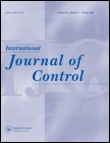
INTERNATIONAL JOURNAL OF CONTROL
Scope & Guideline
Exploring Innovations in Dynamic Systems
Introduction
Aims and Scopes
- Control Theory and Applications:
The journal publishes research on various aspects of control theory, including linear and nonlinear systems, adaptive control, robust control, and optimal control. It emphasizes both the theoretical foundations and practical applications of these theories. - Dynamic Systems and Automation:
Research on automation technologies and dynamic systems is a core area, where contributions often involve the modeling and control of systems ranging from industrial processes to robotics. - Stochastic and Hybrid Systems:
The journal also covers stochastic control systems and hybrid systems, focusing on the analysis and design of control strategies that account for uncertainty and switching behavior. - Networked Control Systems:
Another significant area of focus includes networked control systems, exploring challenges and solutions related to communication delays, packet loss, and cyber-physical systems. - Event-Triggered and Adaptive Control:
The journal promotes research on event-triggered control strategies and adaptive control techniques, which are crucial for optimizing system performance while reducing resource usage. - Multi-Agent Systems and Cooperative Control:
Research on cooperative control among multi-agent systems is highlighted, addressing the complexities of coordination, consensus, and formation control in networked environments.
Trending and Emerging
- Machine Learning and Data-Driven Control:
A significant trend in recent publications involves the integration of machine learning techniques into control systems, facilitating data-driven approaches that enhance adaptability and predictive capabilities. - Cyber-Physical Systems and Security:
With the rise of the Internet of Things (IoT) and smart systems, the journal has increasingly published research on cyber-physical systems, focusing on security, resilience, and real-time control. - Event-Triggered Control and Resource Efficiency:
There is a growing interest in event-triggered control strategies that minimize communication and computational resources, reflecting the need for efficiency in modern control applications. - Robust and Adaptive Control under Uncertainty:
Research focusing on robust and adaptive control techniques that address uncertainties and dynamic environments is on the rise, highlighting the need for systems that can perform reliably under varying conditions. - Nonlinear Control and Advanced Techniques:
A trend towards nonlinear control strategies, including sliding mode control and backstepping techniques, reflects a shift in emphasis towards more complex and realistic system behaviors. - Multi-Agent and Distributed Control Systems:
The exploration of multi-agent systems and distributed control strategies is increasingly popular, emphasizing collaboration and coordination among multiple agents in complex environments.
Declining or Waning
- Traditional PID Control Applications:
There has been a noticeable decrease in papers focused solely on traditional PID control applications, as researchers increasingly explore advanced control strategies that offer more adaptability and robustness in complex environments. - Classical Control Techniques:
Classical control techniques, such as root locus and Bode plot analyses, appear less frequently as the field shifts towards modern techniques that incorporate computational intelligence and machine learning. - Linear Control Systems:
Research specifically centered on linear control systems has waned as the emphasis has shifted towards nonlinear systems and hybrid control approaches that address the complexities of real-world applications. - Single-Input Single-Output (SISO) Systems:
The focus on SISO systems is declining as the complexity of multi-input multi-output (MIMO) systems becomes more prevalent in control applications, reflecting the need for more sophisticated control strategies. - Theoretical Frameworks Without Practical Implications:
There is a decreasing trend in purely theoretical contributions that do not offer practical implications or applications, as the journal's audience seeks research that bridges theory and practice.
Similar Journals
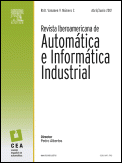
Revista Iberoamericana de Automatica e Informatica Industrial
Fostering Innovation in Automation and InformaticsRevista Iberoamericana de Automatica e Informatica Industrial (ISSN: 1697-7912, E-ISSN: 1697-7920) is a distinguished open-access journal published by UNIV POLITECNICA VALENCIA, EDITORIAL UPV, since its inception in 2007. Based in Valencia, Spain, the journal aims to foster the dissemination of high-quality research in the fields of automation and industrial informatics. With a commendable impact reflected in its 2023 Scopus rankings—Q2 in Computer Science (miscellaneous) and Q3 in Control and Systems Engineering—it serves as a pivotal platform for innovative contributions from both established researchers and emerging scholars. The journal is committed to accessibility, ensuring that all articles are freely available to a global audience, promoting collaborative advancement in technology and engineering. Its coverage spans from 2007 to 2024, making it a valuable resource for those engaged in cutting-edge research and applications in the interdisciplinary landscape of computer science and engineering.

International Journal of Dynamics and Control
Pioneering Research in Control MethodologiesInternational Journal of Dynamics and Control, published by SPRINGERNATURE, is a prestigious academic journal aimed at advancing the fields of Civil and Structural Engineering, Control and Optimization, Electrical, Electronic, and Mechanical Engineering, as well as Modeling and Simulation. With an ISSN of 2195-268X and an E-ISSN of 2195-2698, this journal focuses on high-quality research that addresses complex dynamic systems and control methodologies essential for innovation and progress in engineering disciplines. The journal has achieved significant recognition, being ranked in the second quartile for multiple categories in 2023, which underscores its impact and relevance within the academic community. Although it operates under subscription access, its rigorous peer-review process ensures that published articles meet the highest standards of scientific excellence. Researchers, professionals, and students alike will find valuable insights and methodologies that inform their work and inspire future studies in dynamic systems and controls.

Journal of Systems Science & Complexity
Pioneering Insights in Systems Science for Tomorrow's Challenges.The Journal of Systems Science & Complexity, published by SPRINGER HEIDELBERG, stands as a leading forum for innovative research in the fields of computer science and information systems. With an ISSN of 1009-6124 and an E-ISSN of 1559-7067, this journal has established itself within the academic community, garnering a commendable impact factor that reflects its influential contributions. Operating from 2006 and continuing through 2024, it is categorized in the Q2 quartile for both Computer Science (Miscellaneous) and Information Systems, indicating its quality and relevance. Recognized within Scopus rankings, it places 52nd out of 133 in its specific field, affirming its significance in advancing systems science discussions. Researchers and professionals will find a wealth of knowledge through rigorous peer-reviewed articles that explore complex systems and their applications, enabling readers to stay at the forefront of technological advancements and interdisciplinary collaboration.
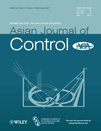
ASIAN JOURNAL OF CONTROL
Transforming Ideas into Engineering SolutionsWelcome to the Asian Journal of Control, an esteemed publication in the fields of Control and Systems Engineering as well as Electrical and Electronic Engineering, published by WILEY. With a continuous convergence from 2000 to 2024, this journal serves as a vital platform for researchers, professionals, and students, offering high-quality peer-reviewed articles that drive innovation and advancement in various control strategies and systems. The journal is renowned for its rigorous academic standards, reflected in its impressive Scopus rankings, with a percentile of 90th in Mathematics (miscellaneous) and 67th in Engineering Control and Systems. Although it does not currently offer open access, the Asian Journal of Control remains an indispensable resource for those looking to push the boundaries of knowledge in engineering disciplines. With its Q2 category ranking in both relevant fields, the journal is poised to influence future research and applications, making it a must-read for those invested in the evolving landscape of control technologies.
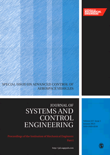
PROCEEDINGS OF THE INSTITUTION OF MECHANICAL ENGINEERS PART I-JOURNAL OF SYSTEMS AND CONTROL ENGINEERING
Advancing Innovation in Mechanical Systems and Control EngineeringPROCEEDINGS OF THE INSTITUTION OF MECHANICAL ENGINEERS PART I - JOURNAL OF SYSTEMS AND CONTROL ENGINEERING is a prestigious journal published by SAGE Publications Ltd, dedicated to the fields of mechanical engineering and systems and control engineering. With an ISSN of 0959-6518 and an E-ISSN of 2041-3041, this journal has established a notable reputation since its conversion in 1991. It holds a solid Q2 ranking in both the Control and Systems Engineering and Mechanical Engineering categories as of 2023, placing it within the top cohort of its field based on Scopus rankings. This journal serves as a vital platform for researchers, professionals, and students, offering high-quality research articles, reviews, and technical notes that contribute to advancements in engineering practices and innovations. By focusing on the intersection of systems theory and mechanical applications, the journal aims to foster interdisciplinary collaboration and knowledge dissemination. As a premier outlet for scholarly work, it continues to drive progress in the engineering realm, ensuring the accessibility and relevance of cutting-edge research.
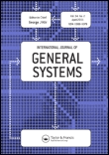
INTERNATIONAL JOURNAL OF GENERAL SYSTEMS
Bridging Disciplines through Systems ThinkingThe INTERNATIONAL JOURNAL OF GENERAL SYSTEMS, published by TAYLOR & FRANCIS LTD, is a prestigious peer-reviewed journal dedicated to advancing the fields of systems theory and its applications across a variety of scientific disciplines. With an ISSN of 0308-1079 and an E-ISSN of 1563-5104, this journal has carved a niche since its inception in 1974, continuing to provide a platform for innovative research through to 2024. Featured in the esteemed Q2 category in multiple domains, including Computer Science Applications, Control and Systems Engineering, and Information Systems, it serves as a vital resource for the scientific community, fostering interdisciplinary collaboration. The journal's rankings in Scopus reflect its quality, with noteworthy positions in fields such as Mathematics, Engineering, and Theoretical Computer Science. While access is through subscription, the journal remains an essential conduit for researchers, professionals, and students eager to deepen their understanding of general systems and their complex interactions within various environments.
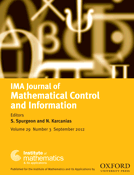
IMA JOURNAL OF MATHEMATICAL CONTROL AND INFORMATION
Unveiling New Methodologies for Control Systems Engineering.IMA Journal of Mathematical Control and Information, published by Oxford University Press, is a prestigious journal dedicated to advancing the fields of mathematical control, optimization, and information theory. Since its inception in 1984, it has been a vital resource for researchers and professionals, providing a platform for high-quality scholarly articles that explore innovative methodologies and theoretical advancements. With an impressive Q2 ranking in categories such as Applied Mathematics and Control Systems Engineering, the journal is recognized for its rigorous peer-review process and significant contributions to mathematics and engineering. While it does not currently offer Open Access options, its impact is reflected in its notable Scopus rankings, including a rank of #47 in Control and Optimization. As it continues to converge into 2024, the IMA Journal remains a cornerstone for academics and practitioners seeking to deepen their understanding and application of mathematical concepts in control and information systems.

Control Theory and Technology
Elevating Understanding in Aerospace and Signal ProcessingControl Theory and Technology, an esteemed journal published by SPRINGER MEDIZIN VERLAG GmBH, serves as a vital platform for the dissemination of cutting-edge research in the fields of control theory, systems engineering, and optimization. With an ISSN of 2095-6983 and E-ISSN of 2198-0942, this journal, which has been operational since 2014, reflects a strong commitment to advancing knowledge within various disciplines, including Aerospace Engineering and Signal Processing, as indicated by its impressive 2023 Scopus rankings and quartile placements. Positioned in Q2 and Q3 categories across multiple engineering and mathematical disciplines, the journal promotes rigorous peer-reviewed articles that explore innovative applications and theoretical developments. Although it does not offer open access, the quality and relevance of the content presented make it an essential resource for researchers, professionals, and students seeking to deepen their understanding and contribute to the rapidly evolving landscape of control technology.
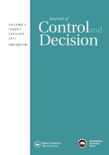
Journal of Control and Decision
Advancing Interdisciplinary Insights in Control SystemsJournal of Control and Decision, published by Taylor & Francis Ltd, is a premier academic journal that serves as a vital resource in the interdisciplinary fields of control systems, artificial intelligence, optimization, and human-computer interaction. Established in 2014 and converging into its upcoming decade, the journal emphasizes rigorous research and practical applications, contributing significantly to both academic discourse and technological advancements. With an impressive categorization in various quartiles, notably Q2 in Control and Systems Engineering and Q3 in several other categories, the journal showcases high-quality contributions that enhance our understanding of complex decision-making processes. Although it currently does not offer open access options, the journal is committed to maintaining impactful scholarly communication, securing its position in Scopus rankings across multiple disciplines. Researchers, practitioners, and students are encouraged to engage with its rich content to foster innovation and knowledge sharing in these dynamic fields.
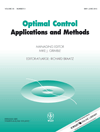
OPTIMAL CONTROL APPLICATIONS & METHODS
Advancing the frontier of control and optimization research.OPTIMAL CONTROL APPLICATIONS & METHODS, published by WILEY, is a prestigious academic journal dedicated to advancing the field of applied mathematics, control, and optimization. With an impressive impact factor in its respective categories—ranking in the second quartile for Applied Mathematics, Control and Optimization, and Control and Systems Engineering—the journal serves as a vital platform for disseminating innovative research findings and methodologies from 1980 to 2024. The journal is indexed in Scopus, with notable rankings in its discipline, highlighting its significance in the scientific community; specifically, it is ranked 143rd in Applied Mathematics and 35th in Control and Optimization, underscoring the quality and relevance of the research it publishes. Although not an open-access journal, it provides essential insights and methodologies of paramount importance to researchers, professionals, and students committed to the fields of control theory and systems engineering. It continues to foster knowledge and collaboration among experts to address complex challenges in automation and optimization.